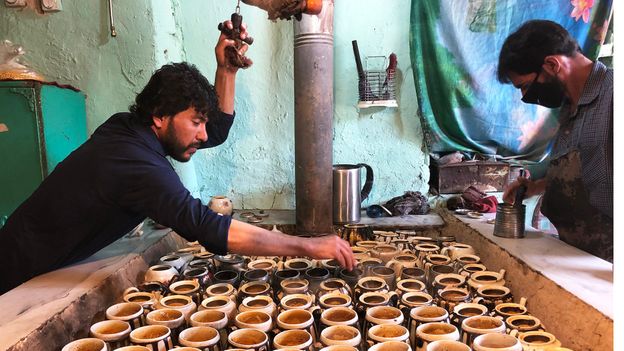At Bacha Broot, the day starts long before the sun rises. “We start the process of cutting the meat at 03:00 and distribute it in all the teapots,” Wahidullah said. “We put 200g of lamb meat, tomatoes, onions, split peas and dash of our secret spice mix,” he said, referring to the special blend of spices that has been a closely guarded family recipe for more than seven decades. He then places the teapots in a tandoor oven where the individual stews slow cook for five hours, and then keeps them hot on the coal-warmed counter. “I work from 03:00 till 21:00; it is very tiring work,” he said.
The restaurant serves up to 100 guests each day in a cramped space that’s neatly divided into two rooms – one for men and one for women. When I visited in March 2021, the men’s room echoed with boisterous conversations covering everything from daily life to politics, and a tiny television blared news and traditional Afghan songs. The women’s section was at the far end of the restaurant, separated by the kitchen and a purdaha thin veil. In this quieter, emptier area, a few women sat cross-legged on a raised platform covered in worn carpet, engrossed in intimate conversations.
In line with Sharia brought on by the Taliban rule, Bacha Broot now plays nasheed (a permissible form of vocal music) instead of news and songs, and still caters to women, provided they are accompanied by their mahrams (male chaperones).
My chainaki was served in a smouldering hot teapot alongside a bowl and naan. To eat it the traditional way, I tore off pieces of naan and put them in the bottom of the bowl then poured the chainaki over the top. The aroma of the long-cooked spices and the rich scent of lamb drifted up, prompting me to eat so quickly that the naan didn’t have the chance to grow soggy. Saberi notes that the naan, which absorbs all the flavours of the stew, can be scooped up by hand or with a spoon.





